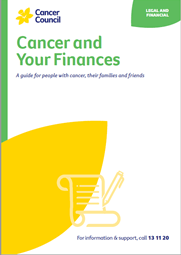- Home
- Cancer Information
- Living well
- Living well after cancer
- Practical concerns
Practical concerns
After cancer treatment, you may have concerns about financial issues, insurance policies and work.
Learn more about:
Financial assistance
For many people, cancer treatment can be a financial strain. This can be caused by extra costs or loss of income. Support is available:
- Your local Cancer Council may be able to organise legal, financial and workplace advice.
- Ask your social worker about whether any financial or practical assistance is available to you. If you have to travel for follow-up appointments, ask about patient travel assistance.
- Call the National Debt Helpline on 1800 007 007 for free, confidential and independent financial counselling.
- Ask your utility company, loan provider or local council how they can help you manage payment of your bills or loans. Check if you qualify for any rebates, concessions or hardship programs.
- Talk to your superannuation fund about applying for an early release of your superannuation on the grounds of severe financial hardship. Find out how this will affect your retirement and whether your superannuation has any insurance policies that you could claim on.
For more on this, see Cancer and your finances and download a fact sheet on Superannuation and cancer.
I called Cancer Council and ended up speaking to a financial counsellor. She helped me sort things out with the bank.
Vincent
Legal, financial and workplace support
Cancer Council’s Legal, Financial Planning, Small Business and Workplace Referral Services may be able to help if you or someone in your family had cancer, and you need financial, legal or workplace advice.
We can put you in touch with professionals who can help you with: credit and debt issues; mortgage hardship variations; insurance claims and disputes; managing workplace issues; navigating a return to work; and transitioning to retirement. Some services are not available in all states and territories.
Call 13 11 20 to find out what services are available in your area and whether you are eligible for this assistance.
Insurance
Applying for new insurance (life, income protection or travel) may be harder because you have had cancer. You are generally required to provide your medical history, including any diagnosis of cancer.
In general, you should be able to buy insurance for things that are not cancer-related (like travel insurance for lost luggage or life insurance for accidental death). It may be difficult to buy travel insurance that covers cancer-related medical problems, but you should be able to get coverage for non-cancer-related medical costs. It is a good idea to check exactly what is covered before buying a new insurance policy.
For more on this, see our Life insurance fact sheet.
Podcast for people affected by cancer
Listen now
More resources
Prof Michael Jefford, Medical Oncologist and Director, Australian Cancer Survivorship Centre, Peter MacCallum Cancer Centre, VIC; Lucy Bailey, Nurse Counsellor, Cancer Council Queensland; Philip Bullas, Consumer; Dr Kate Gunn, Clinical Psychologist and Senior Research Fellow, Department of Rural Health, University of South Australia, SA; Rosemerry Hodgkin, 13 11 20 Consultant, Cancer Council WA; Prof David Joske, Clinical Haematologist, Sir Charles Gairdner Hospital and Clinical Professor of Medicine, The University of Western Australia, WA; Kim Kerin-Ayres, Clinical Nurse Consultant, Cancer Survivorship, Concord Hospital, NSW; Sally Littlewood, Physiotherapist, Seymour Health, VIC; Georgina Lohse, Social Worker, GV Health,VIC; Melanie Moore, Exercise Physiologist and Clinical Supervisor, University of Canberra Cancer Wellness Clinic, ACT; June Savva, Senior Clinician Dietitian, Nutrition and Dietetics, Monash Cancer Centre, Monash Health, VIC; Dr Elysia Thornton-Benko, Specialist General Practitioner and Research Fellow, University of New South Wales, NSW; Prof Janette Vardy, Medical Oncologist, Concord Cancer Centre and Professor of Cancer Medicine, The University of Sydney, NSW; Lyndell Wills, Consumer.
View the Cancer Council NSW editorial policy.
View all publications or call 13 11 20 for free printed copies.
Need to talk?
Support services
Life after cancer treatment
Programs and support for people who have finished treatment
ENRICH – a free healthy lifestyle program
A face-to-face exercise and nutrition program for cancer survivors
Cancer information
Practical concerns
Worried about money, work or your legal rights after a cancer diagnosis? Read our useful tips and find sources of support
View our publications
Guides and fact sheets for people with cancer, their families and friends

